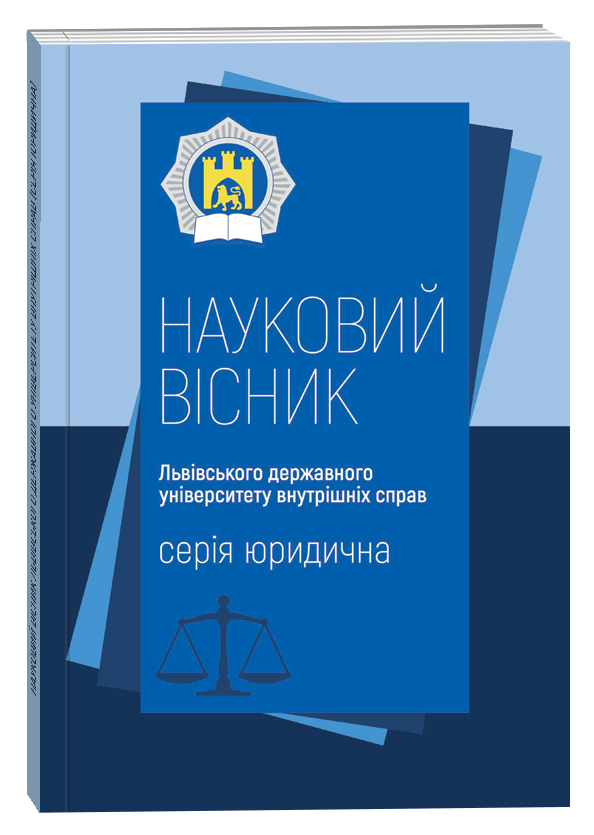DIGITALIZATION OF JUSTICE IN THE CONTEXT OF E-COURT SYSTEM IMPLEMENTATION: CHALLENGES AND TASKS
DOI:
https://doi.org/10.32782/2311-8040/2023-1-8Keywords:
justice, digital technologies, E-Court, informatization, court, reforms, law, judicial system; electronic justice, artificial intelligenceAbstract
The article analyzes normative legal acts regulating the digitalization of the judicial system. The main elements of digital justice used in modern Ukraine are considered. Approaches to the possibility of using artificial intelligence in the domestic judicial system are revealed. Emphasis is placed on the term "digitalization of justice", in particular in the context of the transfer of most communications to the digital environment, as well as based on an overview of the systems that provide the judicial process today. In addition, the article raises the issue of the importance and necessity of implementing digital technologies in the administration of justice and what problems must be overcome during the digitalization and informatization of justice. The advantages and disadvantages of electronic technologies are considered, as well as what barriers judges may face during the digitalization of the court, what measures will have to be taken to implement modern technologies during the digitalization of justice. The problems without the solution of which electronic justice will not be able to develop are singled out, namely: the lagging of the software component from modern standards; insufficient technical support, especially in remote regions; lack of a common interface and data exchange standards; rejection of the documentary form of information submission as the main for legally significant information; ignoring the features of the digital environment. Therefore, options for solving these problems are proposed. It was emphasized that digitalization is aimed at creating a communication system between participants in the judicial process. The idea of electronic justice became possible thanks to the use of IT technologies in justice. It was concluded that e-justice, as a positive perspective, is currently able to create an effective way of communication, namely the transmission of information via the Internet: filing lawsuits, motions, complaints, holding hearings, which is certainly positive for the realization of the main goals of justice, capable of significantly simplifying, speeding up and minimizing the costs of the participants in the court process for visiting court institutions. Such a system significantly simplifies and speeds up their activities, making the work of the court more productive.
References
Про Річну національну програму під егідою Комісії Україна – НАТО на 2021 рік: Указ Президента України В. Зеленського від 11.05.2021 № 189. База даних «Законодавство України» / ВР України. URL: https://zakon.rada.gov.ua/laws/show/189/2021#Text (дата звернення: 15.01.2023).
Каламайко А. Ю. Цифровізація правосуддя та доступ до правосуддя під час COVID. Юридичний бюлетень. 2020. Вип. 14. С. 98–108.
Які проблеми може вирішити штучний інтелект в Україні. Юридична Газета. 2021. 24 трав. URL: https://yur-gazeta.com/dumka-eksperta/yaki-problemi-mozhe-virishiti-shtuchniy-intelekt-v-ukrayini.html (дата звернення: 15.01.2023).
2020 WJP Rule of Law Index Shows Sustained Negative Slide Toward Weaker Rule of Law Around the World. URL: https://ceeliinstitute.org/2020-wjp-rule-of-law-index-shows-sustained-negative-slide-towardweaker-rule-of-law-around-the-world/ (viewed on 15.01.2023).
Сакара Н. Ю. Проблема доступності правосуддя у цивільних справах: монографія. Харків: Право, 2010. 256 с.
Проект Плану відновлення України. Матеріали робочої групи «Юстиція». URL: https://www.kmu.gov.ua/storage/app/sites/1/recoveryrada/ua/justice.pdf (дата звернення: 15.01.2023).
Wu T., Chen M. The Building of Smart Court – Value and Design. Social Sciences. 2019. No. 5. P. 106–107.
Адміністративістика в умовах цифровізації: теорія, правове регулювання, практика: монографія / авт. кол.: С. В. Ківалов, Л. Р. Біла-Тіунова, Т. А. Латковська та ін. Одеса: Вид. дім «Гельветика», 2022. 800 с.
Дія. Держава у смартфоні: офіц. вебсайт. URL: https://diia.gov.ua/ (дата звернення: 15.01.2023)/
Електронний суд: офіц. вебсайт. URL: https://id.court.gov.ua/ (дата звернення: 15.01.2023).
Чалабієва М. Р. «Суд у смартфоні» як штучний інтелект у правосудді: реалії та перспективи. Юридичний науковий електронний журнал. 2021. № 10. С. 94–96.
Гусєва В. Перспективи впровадження інноваційних технологій у практику розслідування кримінальних правопорушень. Сучасні тенденції розвитку криміналістики та кримінального процесу в умовах воєнного стану. Харків, 2022. С. 170–173. URL: https://dspace.univd.edu.ua/xmlui/bitstream/handle/123456789/14929/Perspektyvy%20vprovadzhennia_Husieva_2022.pdf?sequence=1 (дата звернення: 15.01.2023).
Радутний О. Е. Юридична освіта та сфера надання правових послуг в контексті штучного інтелекту. Інформація і право. 2019. № 2. С. 40–54.
Робот-суддя. Закон і Бізнес. 2017. 25 лют. – 3 берез. URL: https://zib.com.ua/ua/print/127739-kompyuterniy_suddya_peredbachae_rishennya_espl_z_tochnistyu_.html (дата звернення: 15.01.2023).
Strojin G. Use of e-devices in judicial proceedings in a Convention-compliantmanner. URL: https://rm.coe.int/intervention-gregor-strojin-2786-0306-9188-v-1/1680a40bb3 (viewed on 15.01.2023).
Singapore sentences man to death via Zoom call. URL: https://www.theguardian.com/world/2020/may/20/singapore-sentences-man-todeath-via-zoom-call (viewed on 15.01.2023).
Доронін І. М. Загрози національній безпеці в умовах цифрових трансформацій та межі державного регулювання. Соціальна і цифрова трансформація: теоретичні та практичні проблеми правового регулювання: матер. наук.-практ. конф. (м. Київ, 10 груд. 2020 р.) / упоряд.: О. А. Баранов, В. М. Фурашев, С. О. Дорогих. Київ: Фенікс, 2020. С. 40.
Конвенція про захист прав людини і основоположних свобод: міжнар. док. від 04.11.1950 / Рада Європи. База даних «Законодавство України» / ВР України. URL: https://zakon.rada.gov.ua/laws/show/995_004#Text (дата звернення: 15.01.2023).
Susskind R. Online Courts and the Future of Justice. Oxford: Oxford University Press, 2019. 398 p.
European ethical Charter on the use of Artificial Intelligence in judicial systems and their environment. Adopted at the 31st plenary meeting of the CEPEJ (Strasbourg, 3–4 December 2018). URL: https://rm.coe.int/ethical-charter-en-for-publication-4-december-2018/16808f699c (viewed on 15.01.2023).
Штучний інтелект у правосудді / Центр демократії та верховенства права. URL: https://cedem.org.ua/analytics/shtuchnyj-intelekt-pravosuddia/ (дата звернення: 15.01.2023).
Про захист персональних даних: Закон України від 01.06.2010 № 2297-VI. База даних «Законодавство України» / ВР України. URL: https://zakon.rada.gov.ua/laws/show/2297-17#Text (дата звернення: 01.02.2023).
Про схвалення Концепції розвитку штучного інтелекту в Україні: розпорядження Кабінету Міністрів України від 02.12.2020 № 1556-р. База даних «Законодавство України» / ВР України. URL: https://zakon.rada.gov.ua/laws/show/1556-2020-%D1%80#Text (дата звернення: 01.02.2023).
Токарєва К. С. Особливості правового регулювання штучного інтелекту в Україні. Юридичний вісник. 2021. № 3 (60). URL: http://www.law.nau.edu.ua/images/Nauka/Naukovij_jurnal/2021/3-60/23.pdf (дата звернення: 01.02.2023).
Artificial intelligence ISO/IEC JTC 1/SC 42. ISO. URL: https://www.iso.org/committee/6794475.html (viewed on 01.02.2023).
Штучний інтелект допоможе уникнути повторних злочинів: Мін’юст запускає «Касандру». Укрінформ. 2020. 13 верес. URL: https://www.ukrinform.ua/rubric-technology/3098629-stucnij-intelektdopomoze-uniknuti-povtornihzlociniv-minust-zapuskae-kasandru.html (дата звернення: 01.02.2023).
Про затвердження плану заходів з реалізації Концепції розвитку штучного інтелекту в Україні на 2021–2024 роки: розпорядження Кабінету Міністрів України від 12.05.2021 № 438-р. База даних «Законодавство України» / ВР України. URL: https://zakon.rada.gov.ua/laws/show/438-2021-%D1%80#Text (дата звернення: 01.02.2023).









